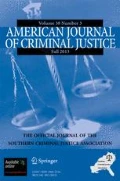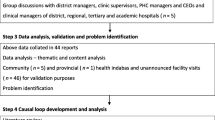Abstract
Systems change efforts seek to alter the status quo by shifting the form and function of a targeted system. Evaluation is a critical component, yet little research has examined a collaborative forum as a vehicle for change in the criminal justice system. Over 150 citizens and police were brought together to work collaboratively at improving a Canadian police complaints system. Using survey, participant observation, and focus group data, this study investigates the perceptions of this Forum as a vehicle for systems change in police oversight mechanisms. We find the Forum provided both opportunities for, and barriers to, collaborative systems change work. However, these findings need to be understood within the context of police-community relations as fear and mistrust of police influence problem definitions and potential solutions. Therefore, the collaboratives model is not a one-size-fits-all approach to systems change work in the criminal justice system.
Similar content being viewed by others
Notes
Forum Partners include Dixon Hall, Kensington-Bellwoods Community Legal Service, Ryerson University, Scadding Court Community Centre, Toronto Police Service, University of Toronto, and the University of Waterloo. Forum Associates include Alexandra Park Neighbourhood Learning Centre, Covenant House, Justice for Children and Youth, Midaynta Community Services, Schizophrenia Society of Ontario, and the Youth and Police Advocacy Group. The Social Sciences and Humanities Research Council, the Law Foundation of Ontario, and the City of Toronto provided funding for the Forum.
Representatives from the following agencies participated as panel speakers: OIPRD, Ontario Provincial Police, Toronto Police Accountability Coalition, Toronto Police Service, Law Enforcement Management Institute of Texas, St. Stephen’s Community House, Anishinabek Police Service, Schizophrenia Society of Ontario, and the Office of Student Conflict Resolution at York University.
Breakout group sessions themes covered four aspects of the system: (1) Complaint decision-making process; (2) investigative complaint process; (3) accountability, accessibility, and transparency; and (4) public outreach and support.
All research assistants conducting participant observation received a three-hour training session and supporting materials. The principal investigator attended both panel presentations, took field notes, and reviewed segments of the field notes from each observer to ensure the content for various remarks and events were captured. All panel field notes were also reviewed at the end of the first day and feedback provided before commencing further observations. The level of agreement was very high as the research assistants adhered to the research protocol covered in the training session and resources provided.
The first version of the transcript was created using ExpressScribe. To ensure validity of the transcripts a second researcher verified the transcription by reading through the text. Finally, a third researcher conducted an audio verification.
In contrast to the Likert style questions, these were all scale level variables measured on a 10-point scale. Participants were asked to, ‘rate on a scale of 1 to 10 (with 1 = absolutely disagree and 10 = absolutely agree), how you feel about the following aspects of the Forum […]’
The registration survey was not analyzed in this study as it only includes requests for information, food restrictions, and demographic questions. It was used to determine the number of delegates registered and present on Day 1 and if there were any significant differences between those registered and delegates present at the end of Day 2 to complete the survey.
The two items that did not load on this factor are: (1) views shared in the breakout group sessions positively affected recommendations put forward to improve the police complaints system (0.447); and (2) the Forum met my expectations (0.413).
Likert responses were dichotomized, whereby ‘strongly agree’ and ‘agree’ were coded as 1 and ‘strongly disagree’, ‘disagree’, and ‘neutral’ were coded as 0. The focus of the analysis rested on those that agreed.
Several delegates (11 %) self-identified as mentally ill or (dis)abled. Further, a representative from the Schizophrenia Society told his story as a keynote speaker in a panel presentation.
Affected communities are those that collectively feel they receive unnecessary and unfair police attention. For example, some individuals from lower-income areas expressed that they were often targeted by police for stop and search practices without just cause. A number of researchers have examined the issue of racial profiling practices of police particularly in low SES neighborhoods (see MacAlister, 2011, Satzewich & Shaffir, 2009).
Some participants felt this way despite efforts by Forum organizers to help prepare participants by holding five pre-Forum educational sessions, providing documentation/legislative summaries available online, and including pertinent summaries in the delegate folder distributed on-site at registration.
All four facilitators were interviewed, trained, and possessed extensive prior experience facilitating small and large groups. This suggests it is the subject matter that played a role in the group dynamics.
References
Behrens, T. R., & Foster-Fishman, P. G. (2007). Developing operating principles for systems change. American Journal of Community Psychology, 39(3–4), 411–414.
CEAPC (2006). Summary analysis of Bill 103: An Act to establish an Independent Police Review Director and create a new public complaints process by amending the Police Services Act. Toronto, ON: Community Education and Access to Police Complaints Demonstration Project.
Chatterjee, A., & Schulenberg, J.L. (2013). The Ontario police complaints system forum: Perspectives from the community, police and policy-makers. Final report prepared for the Attorney General of Ontario and the Office of the Independent Police Review Director. Available from http://www.scaddingcourt.org/pdflibrary/2013police-forum-report.pdf
Checkland, P. (1999). Systems thinking, systems practice. New York: John Wiley & Sons.
Checkland, P., & Scholes, J. (1999). Soft systems methodology in action. New York: John Wiley & Sons.
Christie, C. A., Montrosse, B. E., & Klein, B. M. (2005). Emergent design evaluation: A case study. Evaluation and Program Planning, 28(3), 271–277.
Clarke, S. (2009). Arrested oversight: A comparative analysis and case study of how civilian oversight of the police should function and how it fails. Columbia Journal of Law and Social Problems, 43(1), 1–49.
Ferdik, F. V., Rojek, J., & Alpert, G. P. (2013). Citizen oversight in the United States and Canada: An overview. Police Practice and Research, 14(2), 104–116.
Filstad, C., & Gottschalk, P. (2011). Performance evaluation of police oversight agencies. Policing & Society, 21(1), 96–109.
Foster-Fishman, P. G., & Behrens, T. R. (2007). Systems change reborn: Rethinking our theories, methods and efforts in human services reform and community-based change. American Journal of Community Psychology, 39(3–4), 191–196.
Foster-Fishman, P. G., Nowell, B., & Yang, H. (2007). Putting the system back into systems change: A framework for understanding and changing organizational and community systems. American Journal of Community Psychology, 29(3–4), 197–215.
Hodges, S., & Ferreira, N. I. (2012). If we’re going to change things, it has to be systemic: Systems change in children’s mental health. American Journal of Community Psychology, 49(3–4), 526–537.
John Howard Society (2005). An examination of citizen involvement in complaints regarding police. Calgary, AB: John Howard Society of Alberta. Available from http://www.johnhoward.ab.ca/docs/police/police.pdf. Accessed 05 June 2015.
Kreger, M., Brindis, C. D., Manuel, D. M., & Sassoubre, L. (2007). Lessons learned in systems change initiatives: Benchmarks and indicators. American Journal of Community Psychology, 39(3–4), 301–320.
MacAlister, D. (2011). The law governing racial profiling: Implications of alternative definitions of the situation. Canadian Journal of Criminology and Criminal Justice, 53(1), 95–103.
Miller, J. (2002). Civilian oversight of policing: Lessons from the Literature. Available from http://www.vera.org/publication_pdf/178_338.pdf. Accessed 06 June 2015.
Mizrahi, T., & Rosenthal, B. B. (1992). Managing dynamic tensions in social change coalitions. In T. Mizrahi & J. Morrison (Eds.), Community organization and social administration: Advances, trends, and emerging principles. New York: Haworth.
Murphy, C., & McKenna, P. (2012). Police investigating police: Making change happen. Ottawa, ON: Commission for Public Complaints Against the RCMP. Retrieved from http://www.cpc-cpp.gc.ca/cnt/tpsp-tmrs/police/projet-pip-pep-eng.aspx. Accessed 02 Aug 2015.
Nowell, B. (2009). Profiling capacity for coordination and systems change: The relative contribution of stakeholder relationships in interorganizational collaboratives. American Journal of Community Psychology, 44(3), 196–212.
O’Connor, P. A. (2007). Using system differences to orchestrate change: A systems guide intervention model. American Journal of Community Psychology, 39(3), 393–403.
OIPRD (2016). OIPRD Annual Report 2014–2015. Toronto, ON: Office of the Independent Police Review Director. Available from: http://www.oiprd.on.ca/EN/PDFs/OIPRD-AnnualReport-2014-2015_E.pdf. Accessed 14 July 2016.
Parsons, B. A. (2007). The state of methods and tools for social systems change. American Journal of Community Psychology, 39(3), 405–409.
Prenzler, T., & Ronken, C. (2001). Models of police oversight: A critique. Policing and Society, 11(2), 151–180.
Roman, J. K., Butts, J. A., & Rowan, C. G. (2011). Evaluating systems change in a juvenile justice reform initiative. Children and Youth Services Review, 33(Supplement 1), S41–S53.
Satzewich, V., & Shaffir, W. (2009). Racism versus professionalism: Claims and counter claims about racial profiling. Journal of Criminology and Criminal Justice, 51(2), 199–226.
Schulenberg, J.L., Chenier, A, Buffone, S., & Wojciechowski, C. (2015). An application of procedural justice to stakeholder perspectives: Examining police legitimacy and public trust in police complaints systems. Policing & Society. doi:10.1080/10439463.2015.1102252
Staggs, S. L., White, M. L., Schewe, P. A., Davis, E. B., & Dill, E. M. (2007). Changing systems by changing individuals: The incubation approach to systems change. American Journal of Community Psychology, 39(3–4), 365–379.
Author information
Authors and Affiliations
Corresponding author
Additional information
This research was supported by a Social Sciences and Humanities Research Council of Canada grant.
Rights and permissions
About this article
Cite this article
Buffone, S., Chenier, A., Schulenberg, J.L. et al. Improving the Police Complaints System: Stakeholder Collaboration as a Vehicle for Systems Change. Am J Crim Just 42, 293–313 (2017). https://doi.org/10.1007/s12103-016-9360-8
Received:
Accepted:
Published:
Issue Date:
DOI: https://doi.org/10.1007/s12103-016-9360-8



